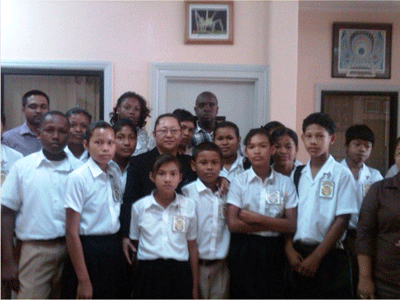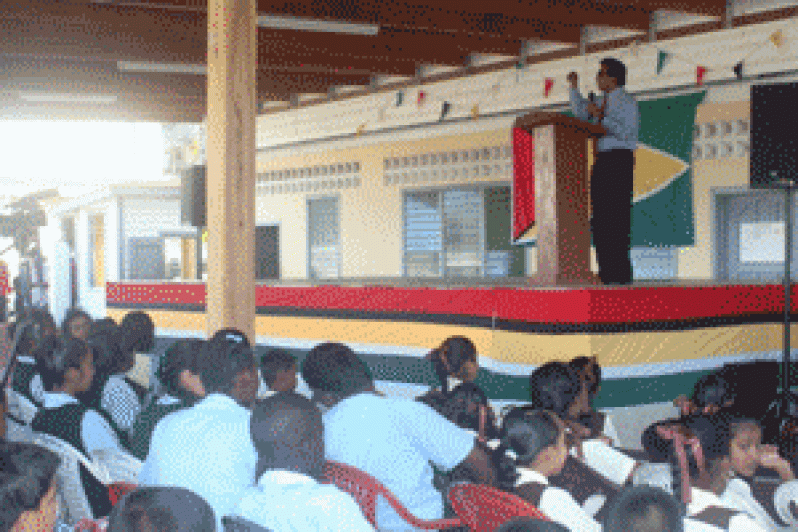MINISTER of Amerindian Affairs, Pauline Sukhai, while attending the 12th session of the United Nations (UN) Permanent Forum on Indigenous Issues to address the implementation of the declaration on the rights of the indigenous peoples at the UN headquarters in New York, spoke of the elevation of Guyana’s indigenous people, initiatives to propel their village economies and their right to representation in several Constitutional rights bodies.
 At the forum held on May 22, Minister Sukhai said, “I am proud to announce that the Government of Guyana stands firmly on the side of our country’s indigenous peoples; and while the achievements are measurable, we still have a lot of work to do amidst the challenges in bridging gaps and obtaining policy objectives…to this end all stakeholders are encouraged to seriously contribute to greater tolerance, respect and recognition for the rights and development of Guyana’s indigenous peoples.”
At the forum held on May 22, Minister Sukhai said, “I am proud to announce that the Government of Guyana stands firmly on the side of our country’s indigenous peoples; and while the achievements are measurable, we still have a lot of work to do amidst the challenges in bridging gaps and obtaining policy objectives…to this end all stakeholders are encouraged to seriously contribute to greater tolerance, respect and recognition for the rights and development of Guyana’s indigenous peoples.”
She pointed out that Guyana’s Constitution, laws and policies underscore the “equality of all peoples”, and explicitly prohibit discrimination on the grounds of ethnicity, gender and religion, not in law, not in policy and not in action.
Amerindians are represented on the five Constitutional Rights Bodies that include the Indigenous People’s Commission and the Ethnic Relations Commission, which offer direct opportunities for Amerindians to have recourse to addressing discrimination and rights issues affecting them.
The Amerindian Act #6 of 2006 provides for the guarantee of Amerindian land rights, self-determination within the State of Guyana subject to state sovereignty, mindful that there is no right to succession which is in keeping with Article #46 of the United Nations Declaration of Rights of Indigenous People (UNDRIP).
“The government’s continued focus on Amerindian land rights and ownership is a major achievement…of the 110 Amerindian communities, 98 have been awarded absolute grant and the successes of the demarcation programme have resulted in the demarcation of 77 of the 98 titled areas,” she said.
Minister Sukhai highlighted that the Amerindian Titling and Demarcation Project (ALT) 2013 – 2015 is expected to complete all titling and demarcation of Amerindian lands for which funding is provided from the Guyana REDD + Investment Fund (GRIF). Allocations this year amount to $77.8M to advance the completion of 12 communities and the  demarcation of 8 titled villages.
demarcation of 8 titled villages.
With regard to self determination, decision making and Free Prior and Informed Consent (FPIC), Minister Sukhai noted that Article #4 of the Amerindian Act provides for the establishment of locally elected village councils, whose mandate is to ensure good governance and management, and use of land and natural resources in their respective villages.
“Guyana has a track record of inclusionary governance and at no time in Guyana’s history was there such a high level of participation of indigenous leaders and people in the body politic of our country… in short indigenous peoples speak for themselves and freely determine their political status and pursue their economic, social and cultural development,” she emphasised.
Participation and the informed voice of the Amerindians are identified in all the major national strategy legislative and developmental fora. Amerindian organisations and the National Toshaos Council (NTC) continue to lend informed voices to formulation, revision and updating of the Low Carbon Development Strategy (LCDS), which aims to transform Guyana’s economy while combating climate change.
The next major step for Amerindians currently is the discussion and approval of the “opt-in mechanism” towards the LCDS for which consultation is ongoing. When addressing economic social and cultural development, Minister Sukhai indicated that the mainstreaming of Amerindian village economies’ development is dependent on the decisions of the communities for which the priorities are captured in the Community Development Plans (CDP) of 166 villages. “The GoG has committed to provide the investment funds in support of the economic initiative of the villages,” she stressed.
When addressing economic social and cultural development, Minister Sukhai indicated that the mainstreaming of Amerindian village economies’ development is dependent on the decisions of the communities for which the priorities are captured in the Community Development Plans (CDP) of 166 villages. “The GoG has committed to provide the investment funds in support of the economic initiative of the villages,” she stressed.
Additionally, government allocated funds this year to finance an innovative project for Amerindian youth empowerment to advance youth capacity building, and increasing skills and capabilities through apprenticeship and entrepreneurial initiatives for community development.
The government has declared a month for the nation to celebrate the diversity of its indigenous nations, as well as their traditional and cultural heritage.
The minister indicated that in consideration to gender issues and domestic violence, the indigenous population, including women and girls, are targeted to benefit from gender based interventions through a national dialogue on domestic violence and a countrywide ‘Stamp it out’ campaign.



.jpg)









